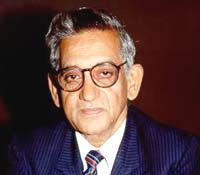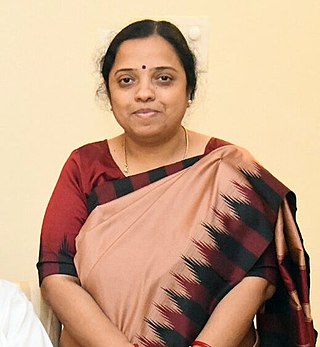Related Research Articles
Indian poetry and Indian literature in general, has a long history dating back to Vedic times. They were written in various Indian languages such as Vedic Sanskrit, Classical Sanskrit, Ancient Meitei, Modern Meitei, Telugu, Tamil, Odia, Maithili, Kannada, Bengali, Assamese, Hindi, Marathi and Urdu among other prominent languages. Poetry in foreign languages such as English also has a strong influence on Indian poetry. The poetry reflects diverse spiritual traditions within India. In particular, many Indian poets have been inspired by mystical experiences. Poetry is the oldest form of literature and has a rich written and oral tradition.

Ramakanta Rath is one of the most renowned modernist poets in the Odia literature. Heavily influenced by the poets such as T. S. Eliot and Ezra Pound, Rath experimented greatly with form and style. The quest for the mystical, the riddles of life and death, the inner solitude of individual selves, and subservience to material needs and carnal desires are among this philosopher-poet's favorite themes. His poetry betrays a sense of pessimism along with counter-aesthetics, and he steadfastly refuses to put on the garb of a preacher of goodness and absolute beauty. His poetry is full of melancholy and laments the inevitability of death and the resultant feeling of futility. The poetic expressions found in his creations carry a distinct sign of symbolic annotations to spiritual and metaphysical contents of life. Often transcending beyond ordinary human capabilities, the poet reaches the higher territories of sharp intellectualism. The contents have varied from a modernist interpretation of ancient Sanskrit literature protagonist Radha in the poem "Sri Radha" to the ever-present and enthralling death-consciousness espoused in "Saptama Ritu".

Pratibha Ray is an Indian academic and writer of Odia-language novels and stories. For her contribution to the Indian literature, Ray received the Jnanpith Award in 2011. She was awarded the Padma Bhushan in 2022.

The Sahitya Akademi Award is a literary honour in India, which the Sahitya Akademi, India's National Academy of Letters, annually confers on writers of the most outstanding books of literary merit published in any of the 22 languages of the 8th Schedule to the Indian constitution as well as in English and Rajasthani language.
The Karan or Karana is a community found in the state of Odisha in India. The post of Karana used to be a professional designation that was occupied by literate peoples. They held Karanam posts in some parts of Andhra Pradesh, where they speak Odia and played a similar role in Odisha to that of the Kayasthas of West Bengal and Bihar. In the social hierarchy of Odisha they rank next to Brahmins. They exclusively served the ruling powers as their ministers, advisors, governors, military commanders, record keepers and dewans. They owned most Zamindaris in Odisha. They have the highest literacy caste-wise and are highly prosperous. Today they are a politically dominant community and have reigned over the politics of Odisha for 50 years.

Manoj Das was an Indian author who wrote in Odia and English. In 2000, Manoj Das was awarded the Saraswati Samman. He was awarded Padma Shri in 2001, the fourth-highest Civilian Award in India, and Padma Bhusan in 2020, the third-highest Civilian Award in India for his contribution to the field of Literature & Education.
Odia literature is literature written in the Odia language, mostly from the Indian state of Odisha. The modern Odia language is mostly formed from Tadbhava words with significant Sanskrit (Tatsama) influences, along with loanwords from Desaja, English, Hindustani (Hindi/Urdu), Persian, and Arabic. Its earliest written texts date from around 1000 CE. The earliest Odia newspaper was Utkala Deepika, first published on August 4, 1866.

Sitakant Mahapatra is an Indian poet and literary critic in Odia as well as English. He served in the Indian Administrative Service (IAS) from 1961 until he retired in 1995, and has held ex officio posts such as the Chairman of National Book Trust, New Delhi since then.

Nityananda Mahapatra was an Indian Odia politician, poet and journalist.

Ramakrushna Nanda was an Indian writer, educator and author of children's literature. He composed the song Ahe Dayamaya Biswa Bihari, a favourite of Mahatma Gandhi when Gandhi was at Sabarmati Ashram. This song was included in his Odia-language textbook Sahitya Sopana.

Arundhathi Subramaniam is an Indian poet and author, who has written about culture and spirituality.
Pratibha Satpathy is a poet of Odia literature. She has been recognised as one of the leading poets of the country and has been honoured with the Sahitya Akademi Award.

Mayadhar Mansingh was an Indian poet and writer who wrote in Odia. He received the Padma Shri, the fourth-highest civilian award in India, in 1967.
Kanhu Charan Mohanty was an Indian Odia language novelist who wrote fifty-six novels in a career spanning over six decades from 1930 to 1985. He is considered "one of the most popular and celebrated novelists of Odisa". Mohanty was awarded the Sahitya Akademi Award in 1958 for his novel, Kaa, published in 1956, and was one of the fellows of the Sahitya Akademi. Mohanty died on 6 April 1994 at the age of 87.
Basanta Kumari Patnaik was an Odia language novelist, short story writer, playwright, poet and essayist; considered to be one of the pioneers in Odia literature. She became famous for her three novels: Amada Bata, Chorabali and Alibha Chita, among which Amada Bata has been adapted into an Odia film by same name.

Gayatribala Panda is an Indian poet, fiction writer and journalist from Bhubaneswar, Odisha, India.

Joba Murmu is an Indian writer and litterateur who is known for her works in Santali literature. She received the Sahitya Akademi's Children's Literature Award on November 14, 2017 for her contribution to Santali literature.

Kishori Charan Das, also known by his short name K.C. Das, was an eminent Indian writer and translator of the Odia and English language. Known for his master interpretation of choices, disillusionment, and insecurities of the Odia middle class. His stories showcases realities of everyday life and do not delve into preaching morals or convey messages. He received the Sahitya Akademi Award in 1976 for his short story collection Thakura Ghara. He was also awarded with the Sarala Puraskar in1985 and Bishuva Puraskar in 1992.
References
- 1 2 "Odia writer Sakuntala Baliarsingh to get Sahitya Akademi award for translation". The Times of India. 2016-02-15. ISSN 0971-8257 . Retrieved 2025-01-17.
- ↑ Behera, Subhakanta (2002). Construction of an Identity Discourse: Oriya Literature and the Jagannath Cult (1866-1936). Munshiram Manoharlal Publishers. pp. xvi. ISBN 978-81-215-1041-7.
- ↑ "For author, morning rituals govern the day". The Times of India. 2020-05-03. ISSN 0971-8257 . Retrieved 2025-01-17.
- ↑ "Sahitya Akademi announces winners of translation prize". India Today. 2016-02-15. Retrieved 2025-01-19.